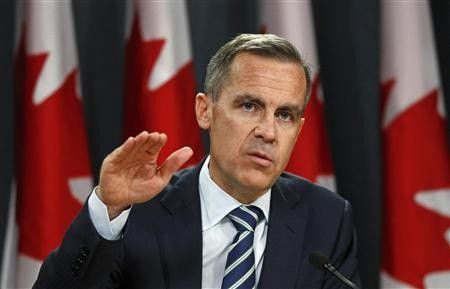BoC Sees U.S., EU Troubles Sapping its Strength

Bank of Canada painted a darker picture of the domestic economy on Wednesday, warning of risks from a likely recession in Europe and continuing weakness in the United States.
In its quarterly Monetary Policy Report, the central bank slashed its fourth-quarter growth forecast to an annualized 0.8 percent from 2.9 percent, down from a likely 2 percent in the third quarter.
We are expecting that the situation in Europe, the weakness in the United States will have an impact on confidence in Canada, central bank Governor Mark Carney told a news conference. What we're expecting is modest growth in Canada and then a pickup, which begins from the middle of next year.
The bank said the economies of the United States and Europe are weaker than they had been following previous recessions and were likely to stay that way, prompting big hits to a Canadian economy that has heavy trade and financial linkages to the United States.
Canada's export-dependent economy recovered more quickly than its partners from the financial crisis of 2008, helped by tax cuts, a government stimulus program and a strong and conservative financial sector that needed no government bailouts.
Already by January, the economy had recovered all the jobs lost during the downturn, although officials warned of high domestic debt levels and external risks ahead.
But consumer confidence fell for the fifth time in six months in October, according to figures released by the Conference Board of Canada on Wednesday, and a Royal Bank of Canada (RBC) survey found that fewer respondents expect the economy to improve over the next year.
The drop in the RBC Canadian Consumer Outlook Index reflects ongoing global economic uncertainty, showing that strong Canadian economic fundamentals insulate us but do not make us immune to the turmoil around the globe, said Craig Wright, senior vice-president and chief economist at RBC.
The central bank assumes that EU leaders, who are meeting on Wednesday, will succeed in their efforts to come up with a plan to contain the euro zone debt crisis, although Carney said that additional European meetings would be needed to come up with details on what would be done.
Our core expectation is that European officials will contain this situation, they will take the necessary measures to ensure there is not substantial contagion from what is going on in Europe to the rest of the global financial system and obviously to the Canadian financial system, he said.
The bank forecasts a European recession starting at the end of this year. It says U.S. growth will average about 1-1/4 percent through the first half of 2012, a level that in previous periods often preceded a recession.
The bank did not predict a U.S. recession - it said it expected the U.S. economy to start to strengthen from the second half of next year - but it noted that if there was a recession there, it would prompt further cuts to Canada's growth and inflation outlook.
The bank said Canadian consumer spending and business investment will be the main engines of growth this year and next, but both are now seen growing more modestly than expected in July.
It sees the economy running at 1-1/4 percent below full capacity in the third quarter, a significantly wider output gap than anticipated earlier.
The bank released the detailed forecasts a day after holding its key interest rate at an ultra-low 1 percent and issuing a statement that focused heavily on global risks.
The bank cut growth and inflation forecasts and shifted to more dovish language, effectively taking any previous talk of future rate hikes completely off the table.
The still robust Canadian housing market has remained an exception to a generally darkening economic picture, and home resale prices hit a record high in August, according to the Teranet-National Bank Composite House Price Index.
It was the ninth consecutive monthly gain in the index, which measures price changes for repeat sales of single-family homes in six metropolitan areas. Overall prices were up 0.9 percent in August from July.
© Copyright Thomson Reuters 2024. All rights reserved.





















